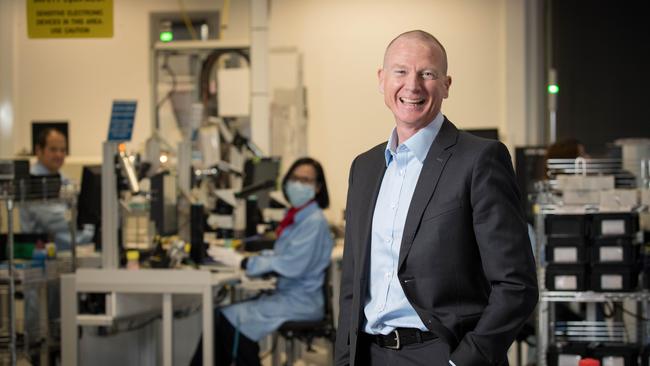Cochlear warns of potential of R&D offshoring
Cochlear says it will continue to invest in R&D as it braces for a profit hit of up to $30m from the coronavirus outbreak

Cochlear says it is being wooed by foreign countries, who are seeking to entice the hearing implant maker to carry out slices of its research and development program overseas.
The overtures come as biotech companies -- including Australia’s biggest health company CSL -- are calling on the Federal Government to deliver consistent research and development incentives after four years of policy review and uncertainty.
Cochlear spends 12 per cent of its annual turnover each year on R&D and almost 70 per cent of its production innovation is completed in Australia.
But chief executive Dig Howitt said Australia risked losing the highly paid jobs associated with advanced manufacturing and product innovation, unless the government delivered a more consistent policy.
“This a really competitive international area,” Mr Howitt told The Australian.
“We have representatives from a range of other countries coming to us, saying ‘bring your R&D to our country, we will give you support to do that because we want the high paying jobs that go along with it’.
“We think it’s in Australia’s interests to make sure that we have competitive offering to keep more of and grow the number of high paying jobs in Australia.”
Mr Howitt said he supported legislation regarding R&D tax incentives which is currently before the Senate and includes raising the cap on eligible R&D expenditure from $100m to $150m late last year.
But he said an R&D policy that relied on tax incentives alone was a blunt instrument and needed to be combined with direct investment and incentives.
“Over the past few years there has been a lot of uncertainty as to what sort of support the government will provide.
“There needs to be a mix of tax and direct incentives to ensure Australia remains competitive.”
Mr Howitt said 85 per cent of Cochlear’s manufacturing is in Australia, while 95 per cent of its revenue comes from overseas. Because Cochlear is based locally, it pays around 80 per cent of its global corporate tax in Australia.
“We do that because our IP and our manufacturing is here. That just sort of shows the benefit of keeping R&D and manufacturing in Australia with incentives that keep Australia competitive with the rest of the world.”
While he said Cochlear remained committed to Australia, unless policy settings changed, overtime more of the company’s R&D spend could drift overseas.
“That’s not doing necessarily less in Australia but incrementally moving some of the work overseas. We have got to think about our customers over the long run.
“We support our customers throughout their lifetime, so … we have got to ensure we are a viable business for a very long period and therefore think rationally about the options we have in front of us.”
Mr Howitt was speaking as Cochlear’s profit flatlined for the six months to December 31 at $132.7m. While the company rebounded from slow hearing implant sales in 2019, and regained market share, with a 14 per cent lift, acoustic sales slumped 9 per cent.
Ord Minnett analyst Athena Kospetas said the contraction in acoustic sales was “unexpected”, while overall unit sales growth of 13 per cent was below her 15 per cent.
Cochlear’s total revenue rose 7 per cent to $755.7m. Its shares closed 3.4 per cent lower on Tuesday at $226.58.
Also weighing on the company was the delay of European regulatory approval for its Osia 2 System implant, after regulations changed from CE Mark to the new EU Medical Device Compliance, which will take effect in May.
The company already has FDA approval in the US and feedback from patients and surgeons has been positive, particularly around Osia’s high frequency hearing outcomes.
Mr Howitt said he expected the new product to launch in Europe mid to late 2021 but said it was difficult to forecast.
“It’s just hard to predict with new regulations what will happen. There’s some uncertainty around that for everyone.
“This regulation contains more requirements than the existing regulations, so that may lead to slower approval of products.
“But we are very excited by the opportunity this product creates to give outstanding hearing outcomes in a market that really has a significant clinical need that is way under-penetrated.”
The company lowered its full year profit guidance last week to $270-290m, compared with previous forecasts of $290-300m, citing the impacts of the deadly coronavirus, which has delayed implant surgeries in China, Hong Kong and Taiwan.
Cochlear will pay an interim dividend of $1.60 a share on April 17, representing a 3 per cent rise on the same period last year.






To join the conversation, please log in. Don't have an account? Register
Join the conversation, you are commenting as Logout